阅读教程翻译 The American Man
- 格式:docx
- 大小:16.49 KB
- 文档页数:5
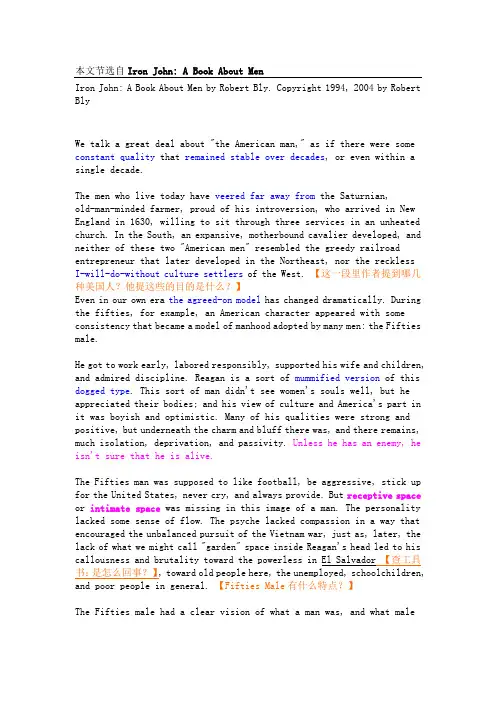
本文节选自Iron John: A Book About MenIron John: A Book About Men by Robert Bly. Copyright 1994, 2004 by Robert BlyWe talk a great deal about "the American man," as if there were some constant quality that remained stable over decades, or even within a single decade.The men who live today have veered far away from the Saturnian,old-man-minded farmer, proud of his introversion, who arrived in New England in 1630, willing to sit through three services in an unheated church. In the South, an expansive, motherbound cavalier developed, and neither of these two "American men" resembled the greedy railroad entrepreneur that later developed in the Northeast, nor the recklessI-will-do-without culture settlers of the West. 【这一段里作者提到哪几种美国人?他提这些的目的是什么?】Even in our own era the agreed-on model has changed dramatically. During the fifties, for example, an American character appeared with some consistency that became a model of manhood adopted by many men: the Fifties male.He got to work early, labored responsibly, supported his wife and children, and admired discipline. Reagan is a sort of mummified version of this dogged type. This sort of man didn't see women's souls well, but he appreciated their bodies; and his view of culture and America's part in it was boyish and optimistic. Many of his qualities were strong and positive, but underneath the charm and bluff there was, and there remains, much isolation, deprivation, and passivity. Unless he has an enemy, he isn't sure that he is alive.The Fifties man was supposed to like football, be aggressive, stick up for the United States, never cry, and always provide. But receptive space or intimate space was missing in this image of a man. The personality lacked some sense of flow. The psyche lacked compassion in a way that encouraged the unbalanced pursuit of the Vietnam war, just as, later, the lack of what we might call "garden" space inside Reagan's head led to his callousness and brutality toward the powerless in El Salvador【查工具书:是怎么回事?】, toward old people here, the unemployed, schoolchildren, and poor people in general. 【Fifties Male有什么特点?】The Fifties male had a clear vision of what a man was, and what maleresponsibilities were, but the isolation and one-sidedness of his vision were dangerous.【提问:作者对五十年代男性是什么态度?你觉得他有褒贬吗?】During the sixties, another sort of man appeared. The waste and violence of the Vietnam 【查工具书:了解越战、反越战、战后的反思】war made men question whether they knew what an adult male really was. If manhood meant Vietnam, did they want any part of it? Meanwhile, the feminist movement encouraged men to actually look at women, forcing them to become conscious of concerns and sufferings that the Fifties male labored to avoid. As men began to examine women's history and women's sensibility, some men began to notice what was called their feminine side and pay attention to it. This process continues to this day, and I would say that most contemporary men are involved in it in some way.There's something wonderful about this development--I mean the practice of men welcoming their own "feminine" consciousness and nurturingit--this is important--and yet I have the sense that there is something wrong. The male in the past twenty years has become more thoughtful, more gentle. But by this process he has not become more free. He's a nice boy who pleases not only his mother but also the young woman he is living with. 【提问:这句话怎么理解?作者这么说的意图是什么?作者对Soft Male的态度是什么?】In the seventies I began to see all over the country a phenomenon that we might call the "soft male." Sometimes even today when I look out at an audience, perhaps half the young males are what I'd call soft. They're lovely, valuable people--I like them--they're not interested in harming the earth or starting wars. There's a gentle attitude toward life in their whole being and style of living.But many of these men are not happy. You quickly notice the lack of energy in them. They are life-preserving but not exactly life-giving. Ironically, you often see these men with strong women who positively radiate energyHere we have a finely tuned young man, ecologically superior to his father, sympathetic to the whole harmony of the universe, yet he himself has little vitality to offer.The strong or life-giving women who graduated from the sixties, so to speak, or who have inherited an older spirit, played an important part in producing this life-preserving, but not life-giving, man. 【提问:你同意作者这个说法吗?为什么?作者为这个论点给出理由没有?】I remember a bumper sticker during the sixties that read "WOMEN SAY YES TO MEN WHO SAY NO." We recognize that it took a lot of courage to resist the draft, go to jail, or move to Canada, just as it took courage to accept the draft and go to Vietnam. But the women of twenty years ago were definitely saying that they preferred the softer receptive male. 【这一段有点绕,看明白它的逻辑没有?】So the development of men was affected a little in this preference. Nonreceptive maleness was equated with violence, and receptive maleness was rewarded.Some energetic women, at that time and now in the nineties, chose and still choose soft men to be their lovers and, in a way, perhaps, to be their sons 【这话怎怎么理解?】. The new distribution of "yang" energy among couples didn't happen by accident. Young men for various reasons wanted their harder women, and women began to desire softer men. It seemed like a nice arrangement for a while, but we've lived with it long enough now to see that it isn't working out.I first learned about the anguish of "soft" men when they told their stories in early men's gatherings. In 1980, the Lama Community in New Mexico asked me to teach a conference for men only, their first, in which about forty men participated. Each day we concentrated on one Greek god and one old story, and then late in the afternoons we gathered to talk. When the younger men spoke it was not uncommon for them to be weeping within five minutes. The amount of grief and anguish in these younger men was astounding to me.Part of their grief rose out of remoteness from their fathers, which they felt keenly, but partly, too, grief flowed from trouble in their marriages or relationships. They had learned to be receptive, but receptivity wasn't enough to carry their marriages through troubled times. In every relationship something fierce is needed once in a while: both the man and the woman need to have it. But at the point when it was needed, often the young man came up short. He was nurturing, but something else was required--for his relationship, and for his life.The "soft" male was able to say, "I can feel your pain, and I consider your life as important as mine, and I will take care of you and comfort you." But he could not say what he wanted, and stick by it. Resolve of that kind was a different matter.In The Odyssey, Hermes instructs Odysseus that when he approaches Circe,who stands for a certain kind of matriarchal energy, he is to lift or show his sword. 【查:这是什么典故?】In these early sessions it was difficult for many of the younger men to distinguish between showing the sword and hurting someone. One man, a kind of incarnation of certain spiritual attitudes of the sixties, a man who had actually lived in a tree for a year outside Santa Cruz, found himself unable to extend his arm when it held a sword. He had learned so well not to hurt anyone that he couldn't lift the steel, even to catch the light of the sun on it. But showing a sword doesn't necessarily mean fighting. It can also suggest a joyful decisiveness.The journey many American men have taken into softness, or receptivity, or "development of the feminine side," has been an immensely valuable journey, but more travel lies ahead. No stage is the final stop.【提问:最后这句话中体现作者的什么观点态度吗?】。
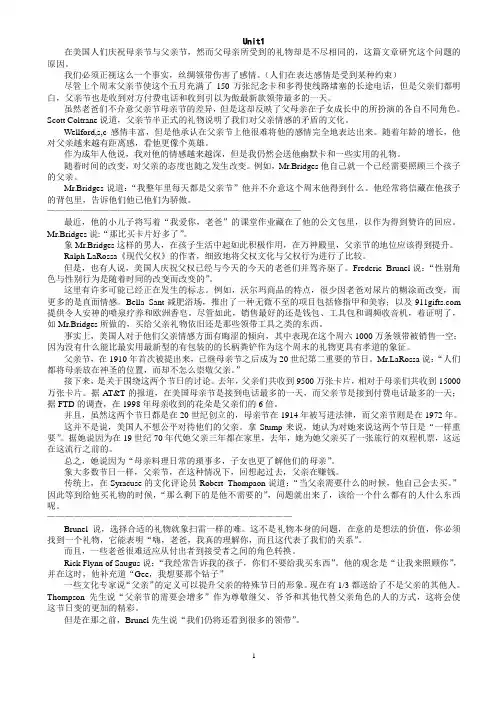
Unit1在美国人们庆祝母亲节与父亲节,然而父母亲所受到的礼物却是不尽相同的,这篇文章研究这个问题的原因。
我们必须正视这么一个事实,丝绸领带伤害了感情。
(人们在表达感情是受到某种约束)尽管上个周末父亲节使这个五月充满了150万张纪念卡和多得使线路堵塞的长途电话,但是父亲们都明白,父亲节也是收到对方付费电话和收到引以为傲最新款领带最多的一天。
虽然老爸们不介意父亲节母亲节的差异,但是这却反映了父母亲在子女成长中的所扮演的各自不同角色。
Scott Coltrane说道,父亲节半正式的礼物说明了我们对父亲情感的矛盾的文化。
Wellford,s,c感情丰富,但是他承认在父亲节上他很难将他的感情完全地表达出来。
随着年龄的增长,他对父亲越来越有距离感,看他更像个英雄。
作为成年人他说,我对他的情感越来越深,但是我仍然会送他幽默卡和一些实用的礼物。
随着时间的改变,对父亲的态度也随之发生改变。
例如,Mr.Bridges他自己就一个已经需要照顾三个孩子的父亲。
Mr.Bridges说道:“我整年里每天都是父亲节”他并不介意这个周末他得到什么。
他经常将信藏在他孩子的背包里,告诉他们他已他们为骄傲。
—————————————————————————————最近,他的小儿子将写着“我爱你,老爸”的课堂作业藏在了他的公文包里,以作为得到赞许的回应。
Mr.Bridges说:“那比买卡片好多了”。
象Mr.Bridges这样的男人,在孩子生活中起如此积极作用,在万神殿里,父亲节的地位应该得到提升。
Ralph LaRossa《现代父权》的作者,细致地将父权文化与父权行为进行了比较。
但是,也有人说,美国人庆祝父权已经与今天的今天的老爸们并驾齐驱了。
Frederic Brunel说:“性别角色与性别行为是随着时间的改变而改变的”。
这里有许多可能已经正在发生的标志。
例如,沃尔玛商品的特点,很少因老爸对尿片的糊涂而改变,而更多的是直面情感。
Bella Sant减肥浴场,推出了一种无微不至的项目包括修指甲和美容;以及 提供令人安神的喷泉疗养和欧洲香皂。
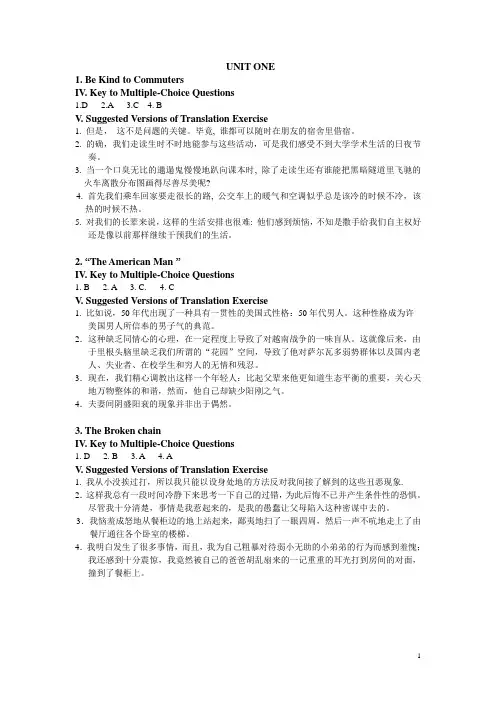
1. Be Kind to CommutersIV. Key to Multiple-Choice Questions1.D2.A3.C4. BV. Suggested Versions of Translation Exercise1. 但是,这不是问题的关键。
毕竟, 谁都可以随时在朋友的宿舍里借宿。
2. 的确,我们走读生时不时地能参与这些活动,可是我们感受不到大学学术生活的日夜节奏。
3. 当一个口臭无比的邋遢鬼慢慢地趴向课本时, 除了走读生还有谁能把黑暗隧道里飞驰的火车离散分布图画得尽善尽美呢?4. 首先我们乘车回家要走很长的路, 公交车上的暖气和空调似乎总是该冷的时候不冷,该热的时候不热。
5. 对我们的长辈来说,这样的生活安排也很难: 他们感到烦恼,不知是撒手给我们自主权好还是像以前那样继续干预我们的生活。
2. “The American Man ”IV. Key to Multiple-Choice Questions1. B2. A3. C.4. CV. Suggested Versions of Translation Exercise1. 比如说,50年代出现了一种具有一贯性的美国式性格:50年代男人。
这种性格成为许美国男人所信奉的男子气的典范。
2.这种缺乏同情心的心理,在一定程度上导致了对越南战争的一味盲从。
这就像后来,由于里根头脑里缺乏我们所谓的“花园”空间,导致了他对萨尔瓦多弱势群体以及国内老人、失业者、在校学生和穷人的无情和残忍。
3.现在,我们精心调教出这样一个年轻人:比起父辈来他更知道生态平衡的重要,关心天地万物整体的和谐,然而,他自己却缺少阳刚之气。
4.夫妻间阴盛阳衰的现象并非出于偶然。
3. The Broken chainIV. Key to Multiple-Choice Questions1. D2. B3. A4. AV. Suggested Versions of Translation Exercise1. 我从小没挨过打,所以我只能以设身处地的方法反对我间接了解到的这些丑恶现象. 2.这样我总有一段时间冷静下来思考一下自己的过错,为此后悔不已并产生条件性的恐惧。
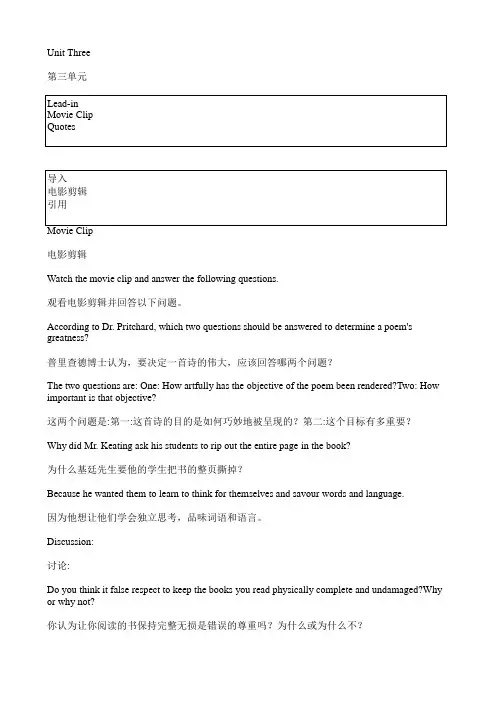
Unit Three第三单元电影剪辑Watch the movie clip and answer the following questions.观看电影剪辑并回答以下问题。
According to Dr. Pritchard, which two questions should be answered to determine a poem's greatness?普里查德博士认为,要决定一首诗的伟大,应该回答哪两个问题?The two questions are: One: How artfully has the objective of the poem been rendered?Two: How important is that objective?这两个问题是:第一:这首诗的目的是如何巧妙地被呈现的?第二:这个目标有多重要?Why did Mr. Keating ask his students to rip out the entire page in the book?为什么基廷先生要他的学生把书的整页撕掉?Because he wanted them to learn to think for themselves and savour words and language.因为他想让他们学会独立思考,品味词语和语言。
Discussion:讨论:Do you think it false respect to keep the books you read physically complete and undamaged?Why or why not?你认为让你阅读的书保持完整无损是错误的尊重吗?为什么或为什么不?(This is an open question.)(这是一个开放的问题。
)Script脚本(From Dead Poets Society)(来自死亡诗人协会)- Gentlemen, open your text to Page 21 of the introduction.Mr. Perry, will you read the opening paragraph of the preface entitled "Understanding Poetry"?-先生们,把你们的文章翻到引言的第21页。
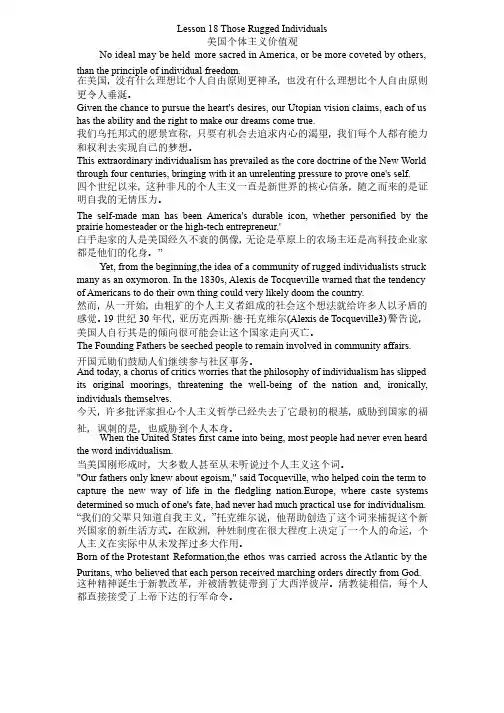
Lesson 18 Those Rugged Individuals美国个体主义价值观美国个体主义价值观No ideal may be held more sacred in America, or be more coveted by others, than the principle of individual freedom. 在美国,没有什么理想比个人自由原则更神圣,也没有什么理想比个人自由原则更令人垂涎。
更令人垂涎。
Given the chance to pursue the heart's desires, our Utopian vision claims, each of us has the ability and the right to make our dreams come true.我们乌托邦式的愿景宣称,只要有机会去追求内心的渴望,我们每个人都有能力和权利去实现自己的梦想。
和权利去实现自己的梦想。
This extraordinary individualism has prevailed as the core doctrine of the New World through four centuries, bringing with it an unrelenting pressure to prove one's self. 四个世纪以来,这种非凡的个人主义一直是新世界的核心信条,随之而来的是证明自我的无情压力。
明自我的无情压力。
The self self--made man has been America's durable icon, whether personified by the prairie homesteader or the high prairie homesteader or the high--tech entrepreneur.'白手起家的人是美国经久不衰的偶像,无论是草原上的农场主还是高科技企业家都是他们的化身。
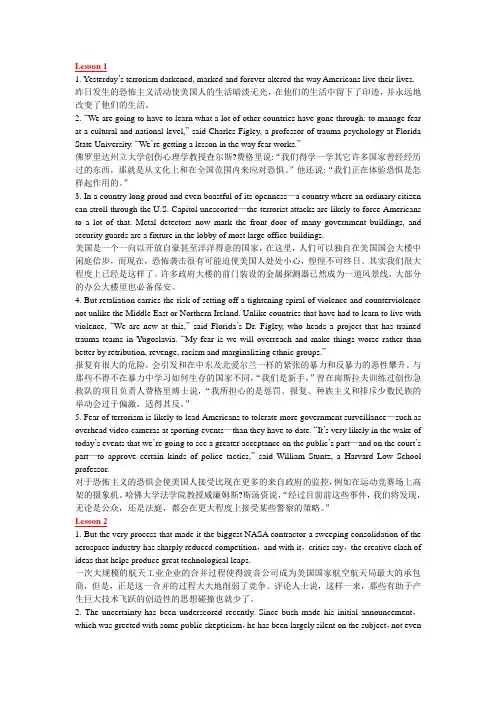
Lesson 11. Yesterday’s terrorism darkened, marked and forever altered the way Americans live their lives. 昨日发生的恐怖主义活动使美国人的生活暗淡无光,在他们的生活中留下了印迹,并永远地改变了他们的生活。
2. “We are going to have to learn what a lot of other countries have gone through: to manage fear at a cultural and national level,” said Charles Figley, a professor of trauma psychology at Florida State University. “We’re getting a lesson in the way fear works.”佛罗里达州立大学创伤心理学教授查尔斯?费格里说:“我们得学一学其它许多国家曾经经历过的东西,那就是从文化上和在全国范围内来应对恐惧。
”他还说:“我们正在体验恐惧是怎样起作用的。
”3. In a country long proud and even boastful of its openness—a country where an ordinary citizen can stroll through the U.S. Capitol unescorted—the terrorist attacks are likely to force Americans to a lot of that. Metal detectors now mark the front door of many government buildings, and security guards are a fixture in the lobby of most large office buildings.美国是一个一向以开放自豪甚至洋洋得意的国家,在这里,人们可以独自在美国国会大楼中闲庭信步,而现在,恐怖袭击很有可能迫使美国人处处小心,惶惶不可终日。
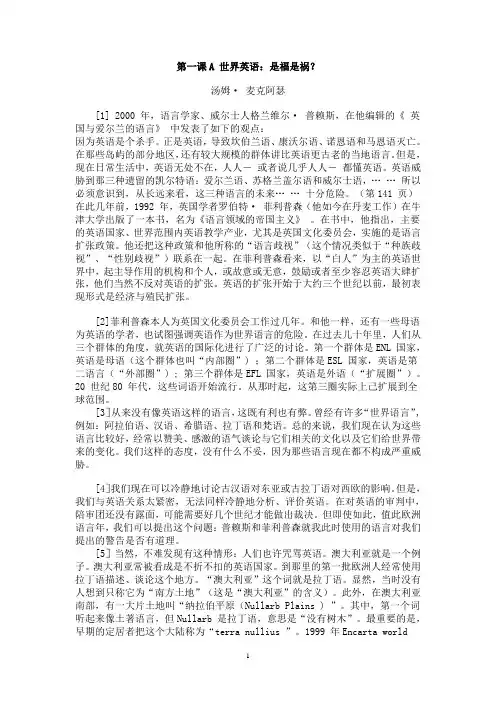
第一课A 世界英语:是福是祸?汤姆·麦克阿瑟[1] 2000 年,语言学家、威尔士人格兰维尔·普赖斯,在他编辑的《英国与爱尔兰的语言》中发表了如下的观点:因为英语是个杀手。
正是英语,导致坎伯兰语、康沃尔语、诺恩语和马恩语灭亡。
在那些岛屿的部分地区,还有较大规模的群体讲比英语更古老的当地语言。
但是,现在日常生活中,英语无处不在,人人―或者说几乎人人―都懂英语。
英语威胁到那三种遗留的凯尔特语:爱尔兰语、苏格兰盖尔语和威尔士语,……所以必须意识到,从长远来看,这三种语言的未来……十分危险。
(第141 页)在此几年前,1992 年,英国学者罗伯特·菲利普森(他如今在丹麦工作)在牛津大学出版了一本书,名为《语言领域的帝国主义》。
在书中,他指出,主要的英语国家、世界范围内英语教学产业,尤其是英国文化委员会,实施的是语言扩张政策。
他还把这种政策和他所称的“语言歧视”(这个情况类似于“种族歧视”、“性别歧视”)联系在一起。
在菲利普森看来,以“白人”为主的英语世界中,起主导作用的机构和个人,或故意或无意,鼓励或者至少容忍英语大肆扩张,他们当然不反对英语的扩张。
英语的扩张开始于大约三个世纪以前,最初表现形式是经济与殖民扩张。
[2]菲利普森本人为英国文化委员会工作过几年。
和他一样,还有一些母语为英语的学者,也试图强调英语作为世界语言的危险。
在过去儿十年里,人们从三个群体的角度,就英语的国际化进行了广泛的讨论。
第一个群体是ENL 国家,英语是母语(这个群体也叫“内部圈”) ;第二个群体是ESL 国家,英语是第二语言(“外部圈”) ; 第三个群体是EFL 国家,英语是外语(“扩展圈”)。
20 世纪80 年代,这些词语开始流行。
从那时起,这第三圈实际上己扩展到全球范围。
[3]从来没有像英语这样的语言,这既有利也有弊。
曾经有许多“世界语言”, 例如:阿拉伯语、汉语、希腊语、拉丁语和梵语。
总的来说,我们现在认为这些语言比较好,经常以赞美、感激的语气谈论与它们相关的文化以及它们给世界带来的变化。
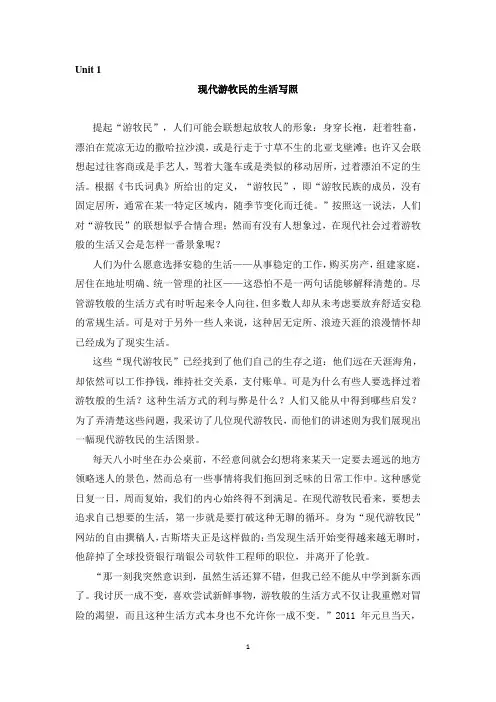
Unit 1现代游牧民的生活写照提起“游牧民”,人们可能会联想起放牧人的形象:身穿长袍,赶着牲畜,漂泊在荒凉无边的撒哈拉沙漠,或是行走于寸草不生的北亚戈壁滩;也许又会联想起过往客商或是手艺人,驾着大篷车或是类似的移动居所,过着漂泊不定的生活。
根据《韦氏词典》所给出的定义,“游牧民”,即“游牧民族的成员,没有固定居所,通常在某一特定区域内,随季节变化而迁徙。
”按照这一说法,人们对“游牧民”的联想似乎合情合理;然而有没有人想象过,在现代社会过着游牧般的生活又会是怎样一番景象呢?人们为什么愿意选择安稳的生活——从事稳定的工作,购买房产,组建家庭,居住在地址明确、统一管理的社区——这恐怕不是一两句话能够解释清楚的。
尽管游牧般的生活方式有时听起来令人向往,但多数人却从未考虑要放弃舒适安稳的常规生活。
可是对于另外一些人来说,这种居无定所、浪迹天涯的浪漫情怀却已经成为了现实生活。
这些“现代游牧民”已经找到了他们自己的生存之道:他们远在天涯海角,却依然可以工作挣钱,维持社交关系,支付账单。
可是为什么有些人要选择过着游牧般的生活?这种生活方式的利与弊是什么?人们又能从中得到哪些启发?为了弄清楚这些问题,我采访了几位现代游牧民,而他们的讲述则为我们展现出一幅现代游牧民的生活图景。
每天八小时坐在办公桌前,不经意间就会幻想将来某天一定要去遥远的地方领略迷人的景色,然而总有一些事情将我们拖回到乏味的日常工作中。
这种感觉日复一日,周而复始,我们的内心始终得不到满足。
在现代游牧民看来,要想去追求自己想要的生活,第一步就是要打破这种无聊的循环。
身为“现代游牧民”网站的自由撰稿人,古斯塔夫正是这样做的:当发现生活开始变得越来越无聊时,他辞掉了全球投资银行瑞银公司软件工程师的职位,并离开了伦敦。
“那一刻我突然意识到,虽然生活还算不错,但我已经不能从中学到新东西了。
我讨厌一成不变,喜欢尝试新鲜事物,游牧般的生活方式不仅让我重燃对冒险的渴望,而且这种生活方式本身也不允许你一成不变。
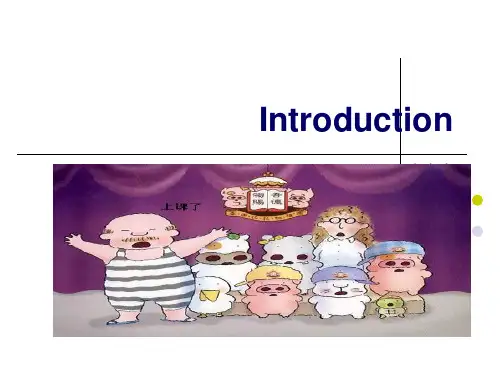
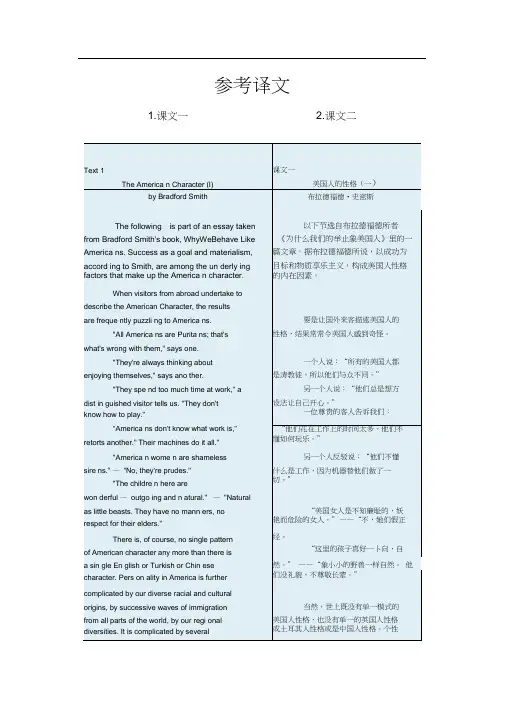
参考译文1.课文一2.课文二Text 1 课文一The America n Character (I) 美国人的性格(一)by Bradford Smith 布拉德福德•史密斯The following is part of an essay taken 以下节选自布拉德福德所者from Bradford Smith's book, WhyWeBehave Like 《为什么我们的举止象美国人》里的一America ns. Success as a goal and materialism, 篇文章。
据布拉德福德所说,以成功为accord ing to Smith, are among the un derly ing 目标和物质享乐主义,构成美国人性格factors that make up the America n character. 的内在因素。
When visitors from abroad undertake todescribe the American Character, the resultsare freque ntly puzzli ng to America ns. 要是让国外来客描述美国人的"All America ns are Purita ns; that's 性格,结果常常令美国人感到奇怪。
what's wrong with them," says one."They're always thinking about 一个人说:“所有的美国人都enjoying themselves," says ano ther. 是清教徒,所以他们与众不同。
”"They spe nd too much time at work," a 另一个人说:“他们总是想方dist in guished visitor tells us. "They don't 设法让自己开心。

READING SELECTION AA Whole Nation and a People[1] There was one storekeeper I remember above all others in my youth, when I was spending a good portion of my time with a motley group of varied ethnic ancestry. We contended with one another to deride the customs of the old country. On our Saturday forays into neighborhoods beyond our own, to prove we were really Americans, we ate hot dogs and drank Cokes. If a boy didn't have ten cents for this repast he went hungry, for he dared not bring a sandwich fro m home made of the spiced meats our families ate.[2] One of our untamed games was to seek out the owner of a pushcart or a store, unmistakably an immigrant, and bedevil him with a chorus of insults and jeers. To prove allegiance to the gang it was necessary to reserve our fiercest malevolence for a storekeeper or peddler belonging to our own ethnic background.[3] For that reason I led a raid on the small, shabby grocery of old Barba Nikos, short, sinewy Greek who walked with a slight limp and sported a flaring, handlebar mustache.[4] We stood outside his store and dared him to come out. When he emerged to do battle, we plucked a few plums and peaches from the basket on the sidewalk and retreated, I go across the street to eat them while he watched. He waved a fist and hurled epithets at us in ornamental Greek.[5] Aware that my mettle was being tested, I raised my arm and threw my half-eaten plum at the old man. My aim was accurate and the plum struck him on the cheek. He shuddered and put his hand to the stain. He stared at me across the street, and although I could not see his eyes, I felt them sear my flesh. He turned and walked silently back into the store. The boys slapped my shoulders in admiration, but it was a hollow victory that rested like a stone in the pit of my stomach.[6] At twilight, when we disbanded, I passed the grocery alone on my way home. There was a small light burning in the score and the shadow of the old man's body outlined against the glass. Goaded by remorse, I walked to the door and entered.[7] The old man moved from behind the narrow wooden counter and stared at me. I wanted to turn and flee, but by then it was too late. As he motioned for me to come closer, I braced myself fora curse or a blow.[8] "Y ou were the one," he said, finally, in a harsh voice.[9] I nodded mutely.[10] "Why did you come back?'[11] I stood there unable to answer.[12] "What's your name?"[13] "Haralambos," I said, speaking to him in Greek.[14] He looked at me in shock, "Y ou are Greek!" he cried. "A Greek boy attacking a Greek grocer!" He stood appalled at the immensity of my crime. "All right," he said coldly. "You are here because you wish to make amends." His great mustache bristled in concentration. "Four plums, two peaches," he said. "That makes a total of seventy-eight cents. Call it seventy-five. Do you have seventy-five cents, boy?"[15] I shook my head.[16] "Then you will work it off," he said. "Fifteen cents an hour into seventy-five cents makes" —he paused— "five hours of work. Can you come here Saturday morning?"[17] "Y es," I said.[18] "Y es, Barba Nikos," he said sternly. "Show respect."[19] "Y es, Barba Nikos," I said.[20] "Saturday morning at eight o'clock," he said. "Now go home and say thanks in your prayers that I did not loosen your impudent head with a solid smack on the ear." I needed no further urging and fled.[21] Saturday morning, still apprehensive, I returned to the store. I began by sweeping, raising clouds of dust in dark and hidden corners. I washed the windows, whipping the squeegee swiftly up and down the glass in a fever of fear that some member of the gang would see me. When I finishedI hurried back inside.[22] For the balance of the morning I stacked cans, washed the counter, and dusted bottles of yellow wine. A few customers entered, and Barba Nikos served them. A little after twelve o'clock he locked the door so he could eat lunch. He cut himself a few slices of sausage, tore a large chunk from a loaf of crisp-crusted bread, and filled a small cup with a dozen black shiny olives floating in brine. He offered me the cup. I could not help myself and grimaced.[23] "Y ou are a stupid boy," the old man said. "Y ou are not really Greek, are you?"[24] "Y es, I am."[25] "Y ou might be," he admitted grudgingly. "But you do not act Greek. Wrinkling your nose at these fine olives. Look around this store for a minute. What do you see?"[26] "Fruits and vegetables," I said. "Cheese and olives and things like that."[27] He stared at me with a massive scorn. "That's what I mean," he said. "You are a bonehead. Y ou don't understand that a whole nation and a people are in this store."[28] I looked uneasily toward the storeroom in the rear, almost expecting someone to emerge.[29] "What about olives?" he cut the air with a sweep of his arm. "There are olives of many shapes and colors. Pointed black ones from Kalamata, oval ones from Amphissa, pickled green olives and sharp tangy yellow ones. Achilles carried black olives to Troy and after a day of savage battle leading his Myrmidons, he'd rest and eat cheese and ripe black olives such as these right here. Y ou have heard of Achilles, boy, haven't you?"[30] "Y es," I said.[31] "Y es, Barba Nikos."[32] "Y es, Barba Nikos," I said.[33] He motioned at the row of jars filled with varied spices. "These are all the marvelous flavorings that we have used in our food for thousands of years. The men of Marathon carried small packets of these spices into battle, and the scents reminded them of their homes, their families, and their children."[34] He walked limping from the counter to the window where the piles of tomatoes, celery, and green peppers clustered. "I suppose all you see here are some random vegetables?" He did not wait for me to answer. "You are dumb again. These are some of the ingredients that go to make up a Greek salad. Do you know what a Greek salad really is? A meal in itself, an experience, an emotional involvement. It is created deftly and with grace. The story goes that Zeus himself created the recipe and assembled and mixed the ingredients on Mount Olympus one night when he had invited some of the other gods to dinner. Do you understand now, boy?"[35] He watched my face for some response and then grunted. We stood silent for a moment until he cocked his head and stared at the clock. "It is time for you to leave," he motioned brusquely toward the door. "We are square now. Keep it that way."[36] I decided the old man was crazy and reached behind the counter for my jacket and cap and started for the door. He called me hack. From a box he drew out several soft, yellow figs that he placed in a piece of paper. "A bonus because you worked well," he said. "Take them. When you taste them, maybe you will understand what I have been talking about."[37] I took the figs and he unlocked the door and I hurried from the store. I looked back once and saw him standing in the doorway, watching me, the swirling tendrils of food curling like mist about his head.[38] I ate the figs late that night. And in the morning when I woke, I could still taste a nd inhale their fragrance.[39] I never again entered Barba Nikos' store, because shortly afterwards my family moved from the city.[40] Some twelve years later, after the war, I drove through the old neighborhood and passed the grocery. I stopped the car and for a moment stood before the store. The windows were stained with dust and grime, the interior bare and desolate, a store in a decrepit group of stores marked for razing so new structures could be built.[41] I have been in many Greek groceries since then and have often bought the feta and Kalamata olives. I have eaten countless Greek salads and have indeed found them a meal for the gods. But I have never been able to recapture the flavor of those figs he gave me on that day so long ago, although I have bought figs many times. I have found them pleasant to my tongue, but there is something missing. And to this day I am not sure whether it was the figs or the vision and passion of the old grocer that coated the fruit so sweetly I can still recall their savor and fragrance after almost thirty years. (1, 478 words)ABOUT THE AuthorHarry Mark Petrakis (1923— ) has written novels and short stories about Greek-American life. His characters are people who live with memories of another culture and seek to join the old ways with new customs and attitudes. Petrakis was born in St. Louis, Missouri and worked at an assortment of jobs, in steel mills and driving trucks, before becoming a writer. The text here is taken from his autobiography, Stelmark.EXERCISES1. Reading ComprehensionAnswer the following questions or complete the following statements.1. When the author was young, he and his friends banded together to _____.A. bully new immigrantsB. fight against old customsC. contend that they were real menD. reject their own ethnic background2. The author and his friends often chose a pushcart or a store of their own nationality to attack because _____.A. they hated their own peopleB. they could thus be respected as real AmericansC. they hated all the peddlers and store keepersD. they could thus get free fruits and other food3. Why did the author feel that the attack on the grocer was a hollow victory after he won the respect of his friends?A. Because he only hit the grocer once.B. Because he could have taken more plums.C. Because he felt sort of guilty in his heart.D. Because he wanted to attack the grocer again4. At twilight the author returned to the grocery store and entered because _____.A. he felt regret and wanted to make amendsB. he wanted to play tricks on the grocerC. he felt hungry and wanted to buy some olivesD. he wanted to check whether the grocer was injured5. Mr. Nikos insisted on t he author's saying “Y es, Barba Nikos" because he wanted the boy to _____.A. remember his nameB. recognize his authorityC. learn how to respect othersD. speak more Greek6. Saturday morning the author washed the windows of the store very quickly because he_____.A. didn't want his friends to see himB. wanted to show that he was a good boyC. was afraid that Mr. Nikos would punish himD. wanted to go hack home early7. Mr. Nikos thought that the author was _____.A. a real GreekB. a real AmericanC. scornful of his small businessD. ignorant of his own culture8. Mr. Nikos believed that the ancient Greek cultureA. was the richest and most colorful in the worldB. had shaped the whole nation of Greece and its peopleC. was of the same value as that of the AmericansD. could be tasted in Greek food9. By describing the appearance of the store twelve years later, the author impliesthat _____.A. old customs and culture should be got rid of in AmericaB. the ethnic cultures were giving way to the American mainstreamC. American value should be restructured and rebuiltD. American society changes quickly and dramatically10. The author conveys his thesis in the last paragraph that _____.A. old people can teach young Americans good lessonsB. Mr. Nikos influenced his perspective in appreciating their own cultureC. Greek food is still the best for American GreeksD. Mr. Nikos was the best teacher he had ever seenII. VocabularyA. Read the following sentences and decide which of the four choices below each sentence closest in meaning go the underlined word.1. In July he issued a decree ordering all unofficial armed groups in the country to disband.A. end upB. come upC. stand upD. break up2. The Amazon ant carries out forays against other ants and brings back some of them to the home nest to serve as slaves.A. invasionsB. fightsC. warsD. missions3. The flu virus that are most prevalent one year differ from those that bedevil humans the next year.A. killB. worryC. frustrateD. trouble4. He correctly predicted that the policy against their neighboring countries would goad them into economic nationalism.A. assistB. pressC. driveD. aid5. The King made war on the state of Kalinga, and conquered in 261 B.C. When he saw the suffering he had caused, however, he was overcome with remorse.A. regretB. revengeC. hatredD. emotion6. When she first visited South-West Africa in 1947 as an investigative journalist, she helped reveal the appalling conditions under which blacks were obliged to work.A. startlingB. exoticC. terrificD. amusing7. In his book the Iliad, Homer describes Thersites as the ugliest and most impudent of the Greeks.A. toughB. ill-famedC. rudeD. harmful8. Apprehensive of their enemy's encirclement, the country enhanced its foreign contacts with its neighbors in Europe.A. ScornfulB. FearfulC. RegardlessD. Careless9. The slave-owners grudgingly accepted the abolition in 1888, rather than face the massive slave unrest and flight.A. slowlyB. graduallyC. unwillinglyD. eventually10. They swore their allegiance to the nation and received their naturalization papers.A. contributionB. loyaltyC. immensityD. epithetB. Choose the best word or expression from the list given for each blank. Use each word or expression only once and make proper changes where necessary.work off contend with deftly sternly brusquelyseek out make amends desolate deride mutely1. It's full of useful give you some idea of all theaspects a business needs to in order to survive in today's current economic climate.2. European market is becoming promising. Now is the time for local companiesbusiness opportunities in Europe.their debt through community service.5. Many students right of freedom. Some of my students once protested to me6. Evidently(Obviously) men of great energy and charm, Bouvier and Thierry found10. His sophisticated theory about economic development is widely derided (laughed at) by conventional scientists.III. ClozeThere are ten blanks in the following passage. Read the passage carefully and choose the right word or phrase from the list given below for each of the blanks. Change the form if necessary.in favor of look down on distinctive traditionally successivediverse despite target in search of integrateAlthough the United States has been shaped by waves ofhave often viewed immigration as aimmigrants. The cultural habits of immigrants are frequentlyespecially arrivals come from a different country than those in the establishedcommunity. such tensions, economic needs have always forced Americans to seek immigrants as foreigners. The vastmajority of immigrants to the United States have comea better life for themselves and their families. In all of American history, less than 10 percent ofthe United States has been described as a melting pot,previous identities of each immigrant group are melted down to create an. Since the 1960s, many Americans have rejected the term ofthe image of themosaic, each piece retains its own identity, while design.Advocates of the term of "mosaic" believe that it better represents the multicultural society of the United States. Today, many Americans value their immigrant heritage as an important part of their identity. More recent immigrant groups from Asia have established communities alongside those populated by the descendants of European immigrants.IV. TranslationPut the following parts into Chinese.1. There was one storekeeper I remember above all others in my youth, when I was spending agood portion of my time with a motley group of varied ethnic ancestry. We contended with one another to deride the customs of the old country. On our Saturday forays into neighborhoods beyond our own, to prove we were really Americans, we ate hot dogs and drank Cokes. If a boy didn't have ten cents for this repast he went hungry, for he dared not bring a sandwich from home made of the spiced meats our families ate.我常和一帮来自各国的移民子弟一起玩。
大学英语阅读教程3翻译大学英语阅读3翻译第一篇:Be kind to commuters Enumerate. 列举,枚举:paradoxical adj. 矛盾的;诡论的;似非而是的 adolescence 青春期instinct 本能 frat 大学联谊会 ditto 同样的camaraderie友情introspection 反思 introspective 内省的 defray 支付 moot 空谈 myth 虚构leftover 吃剩的话breakaway 分离逃脱 detached 分离的 torn 扯开autonomy 主权概述人们往往可以列举出一个大学生住校的各种优点。
然而,作者想揭露的是走读生其实过得并不轻松。
他们的生活是矛盾的,他们本来要去独立地探索大学生活,但是他们和父母在一起就没有可能保持其独立性。
课文你们可能认为走读生过得很轻松。
我们有一个全自动洗衣机,在柜子中有全新的牙膏,还有一个塞满别人买单的食物的冰箱。
除此之外,电话账单有人会付,即便在微波炉中,晚上也会有为我们准备的食物。
你嘲笑,那不是大学,那是永久的青春期。
所以我们看似是被宠坏的孩子,但一切远没那么简单。
走读学生过着矛盾的生活。
比如你,来到大学,开始认识自己;学会认识自己是教育一个很重要的部分。
但是当父母无法放弃他们作为父母本能般的监管时,维持独立是很难的。
如果父母的结婚纪念日在我期末考试前,我该怎么办?事实是,做一个无法脱离家庭的人就跟一个和你不喜欢的人同居寝室一样困难。
我们的问题很复杂。
从某种程度上来说,我们是这个社会的二等公民;我们很难去享受俱乐部,大学生联谊派对,舞会,因为我们要急着赶回家或者去搭末班车。
同样的,你会意识到你来不及做经济法律课的预习因为已经截止了。
但这还不是最严重的。
每个人都需要和室友一起过夜。
真正的问题是我们错过了很多活动:一种由晚上抱佛脚复习产业心理学,闲谈谁和谁一起睡觉,谈论明星,分享心里话,畅谈毕业来的比想象得要快而产生的友谊。
备受煎熬的黑人中产阶级一位美国黑人妇女取得了经济上的成功,并由此迈入中产阶级的行列,黑人和白人的不同反应却令她感到沮丧。
白人认为她是不同寻常的黑人,她的成功依赖的是运气而非才能。
黑人则将她当做背叛者而抛弃她。
然而,内心深处,她知道自己永远是黑人,而且,只要有黑人受到歧视,她就不能说自己成功了。
黑人中产阶级因其成功而备受煎熬,我就是其中一员。
一方面,白人认为我不过是幸运罢了;另一方面,黑人则妒忌我,僧恨我。
一旦获得了机会,能够从事属于白领阶层的工作,和所有人一样,黑人就会对生活抱有极大的希望,这些包括了人们常说的梦中的豪宅,两辆汽车,接受良好的教育,还有孩子们在迪斯尼乐园度过的假期。
这一事实仍会让很多人感到震惊。
实际上,相较于其他美国人,我们黑人更渴望获得这一切,因为我们已有太久无权拥有和享受这些东西了。
同时,在通常被人们称为贫民区的地方,仍生活有相当多的黑人同胞,他们和那些观念陈旧的黑人好战分子一起,总是无休止地责备黑人中产阶级,说我们“忘了本”!’指责我们抛弃了革命,背叛了本民族,变成了白心黑人—皮肤是黑色的,内心却已被白人同化。
而事实是我们不曾忘本,我们也不敢忘本。
我们只不过是奋斗在不同的阵线,也不比他们少厌倦战争。
或许,我们还更伤心,因为我们清楚地知道黑人世界和白人世界本可以融会在一起,而这个融合在一起的世界将会更美好。
只要那些花言巧语的骗子仍无所顾忌地利用儿时的友情来诈骗我,我就不可能忘本。
当我怀着恐惧回到以前住过的地方,钱包被人抢走时,我不会忘本;当我享用商务午餐却发现服务员是老同学时,我也不会忘本。
我回忆起儿时一起玩洋娃娃的女孩,她现在靠福利救济抚养五个子女;而那个住在教堂里的男孩,现在因谋杀罪而被关在监狱里;儿时的密友则因服食过量毒品被发现死在我们曾一起玩捉迷藏的小巷里。
这一切怎能令我忘本!我的生活中充满了不和谐。
精神饱满地从巴黎度假归来,一星期后,我却坐上小公共汽车行驶在熟悉的路上,去南方腹地的穷乡僻壤参加我那年老而又糊涂的叔父的葬礼。
Lesson 21、It is a cliche,as it is to take of apocalypse and nightmare, but when something is beyondour experience,we reach for the points of reference we have.说到世界末日和噩梦又是老生常谈,但是当事情超出我们的经验时,我们总会寻找现有的东西作为参照。
2、Lest you should ever forget the smallness of being human, the iconic Mount Fuji, instantly recognizable yet somehow different on every viewing is an extinct volcano.唯恐你会忘记作为人类的渺小,标志性的富士山,一眼即能认出但不知何故每次观看又呈现出不同景象,就是一座死火山。
3、It surprised me, over the following months that the gas attack seemed to dominate thenational media coverage, whereas Kobe, after the initial weeks of horrifying footage, slipped somewhat into the background.在随后的几个月里,让我吃惊的是毒气攻击似乎占据了国家媒体报道的主要内容,而神户大地震经过了最初几周骇人听闻的电视报道后,已经退居次位了。
4、Rather than immersing ourselves in the language of horror films and the end of the world,when the time is right to try to glimpse this new territory, we might for thought reach fora book by Japan’s most popular contemporary novelist.我们不能沉浸在恐怖片和世界末日的语言中,在合适的时间,如果想要了解这一新的领域,我们可以考虑看看日本最流行的现代小说家的一本书。
我们不厌其烦地谈论“美国男人”,似乎他们身上存在着某种几十年或者十年恒常不变的品质。
当今的美国男人不再是1630年来到新英格兰的快乐的农民了。
他们不再是老脑筋,他们不再以内向的性格为荣,他们不会坐在没有取暖设备的教堂里连做三遍祷告。
在南方,富裕的,成天围着女孩子转的骑士也发展壮大了,但两种“美国男人”都不像之后东北部发达起来的贪婪的铁路承包商。
而不计后果、为所欲为的西部文明移民也不像他们。
即使在我们自己的年代,公认的模范也发生了戏剧性的变化。
举个例子来说,在20世纪50年代,这样一种美国人越来越凸显出来,成为大多数人认可的模范。
这就是50年代的男人。
上班起早贪黑,干活尽职尽责,养家糊口,遵规守纪。
里根就是这类人的典型——固执而坚忍不拔。
这类人弄不懂女人的心,却颇为赏识女人的身体;他们的文化观和文化观的美国部分幼稚而乐观。
他们大都有坚忍不拔、信心十足的品质,但在他们魅力十足、虚张声势的外表下,还有另外的三个特征:孤立、清贫、被动。
他们需要通过自己的敌人来证明自己还活着。
50年代的男人喜欢橄榄球,好斗,他们维护美国,从不流泪,只是默默奉献。
但在这些男人的身上,善于接纳和对人友善的品质消失了。
他们的个性缺乏洋溢感。
他们还缺乏同情心,正是这点怂恿了他们对越战的狂热;就像后来的里根,他的头脑中缺乏那种我们称之为“和平之心”的东西,这使得他对萨尔瓦多那些手无寸铁的人,对
这里的老人、失业者、上学的孩子,乃至对穷人都铁石心肠、残暴野蛮。
50 年代的男人清楚地知道男人该是什么样,男人的职责是什么,但他们自身孤立和片面的观念弄得他们危机四伏。
到了60 年代,又出现了另外一类男人。
越战的荒废和暴虐让他们质疑,自已是否真的知道一个成年男人是什么样子?如果成年等于越战,他们对成年还有一丝一毫的向往吗?同时,女权运动激励男人们开始真切地审视女人,迫使他们开始理解50 年代男人苦苦逃避的担忧和苦楚。
随着男人们开始正视女人的过去和她们的感受,一些人开始留意并专注他们自己的所谓“女性”的那一面。
女权运动一直持续到了今天,我敢说,当代男人或多或少地都曾卷入其中。
这场运动留下了某些美好的东西,我是说男人们开始习惯于迎合并培养自己的女权意识。
这一点很重要。
可是我也觉察到哪里出了问题。
过去的二十年中,男人变得越发体贴和绅士了。
但经历了这场运动,他们却变得越来越不自由了。
一个男孩,能让自己的妈妈还有自己的同居女友高兴,他就是好男孩。
到了70 年代,我开始觉察到在全国范围内普遍存在的一种现象,我们可以称之为“软男人”现象。
时至今日,有时你看看窗外的人群,没准其中一半的年轻男性都是被我称之为“软”的男人。
他们很可爱,他们令人钦佩。
我喜欢他们,因为他们对破坏地球和发动战争不感兴趣。
从他们的所有本性和生活方式中,你可以看到他们对待生活温和友善的态度。
但是他们大多数人都不快乐。
你很快就会发觉他们身上缺乏活力。
他们在维护生命,而不是真正地给予生命。
更具讽刺意味的是,你会经常看到这些男人和强壮的女人在一起,而那些女人又恰恰是活力四射。
我们这里有一位优雅的年轻人,从生态学的角度看,他优于他的父辈,他对全世界和平相处深表赞同,然而他本人却了无生气。
毕业于60 年代的、那些强壮的给予生命的女人,或者说继承了老一辈精神的女人,她们生育了维护生命但却不能给予生命的男人,她们的作用可谓不可或缺。
我记得60 年代有一款汽车保险杠上的贴纸这样说:“男人越说不,女人越说是。
”我们承认抵抗潮流是需要勇气的。
要么蹲监狱,要么移民加拿大,这和应征入伍开赴越南战场差不多。
但是二十年前的女人会说,自己绝对更喜欢既温柔又能容纳对方的男人。
所以男人的成长或多或少地受到了这种偏爱的影响。
不能容纳对方的男人总是被视为暴力,能够容纳对方的男人往往得到赏识。
在那个年代,一些活力四射的女人会选择温柔的男人作情人,兴许在某种程度上也会选他们做儿子。
90 年代的现在,她们仍然会做出这样的选择。
夫妇中“阳刚”之气并没有被重新分配,哪怕只是一两次。
年轻男人有各种各样的理由选择更强健的女人,而女人们也开始心仪更温柔的男人。
这种现象在当时看来不失为好的安排,然而,在我们忍受这种现象足够长的时间之后,我们发现那根本解决不了任何问题。
在早期的男人聚会中,当这些男人给我讲述了他们的故事之后,我第一次了解到了这些“软”男人的苦痛。
1980 年,新墨西哥州的喇嘛会社邀我去给他们作报告,只给男人讲。
这是他们第一次聚会,大约有四十人参加。
每一天我们都专注于一个希腊神或一个老故事,接着下午晚些时候我们聚在一起谈心。
年纪小一点的男人讲话时,五分钟之内就会哭出来,这种情形司空见惯。
这些男人的悲痛和苦恼让我震惊不已。
他们苦痛的一部分源于远离他们的父亲,他们敏锐但只是部分地感受到婚姻或两性关系中的麻烦。
他们已经学会了容纳对方,但这仍不足以帮他们度过婚姻的难关。
每一种关系都会偶尔需要一种强烈的东西:男人该有,女人也该有。
但在真正需要的时候,年轻人往往又英雄气短了。
他努力酝酿,但往往很快又会需要另外一种东西。
为了爱情,为了生活。
“软”男人会说:“我能感受到你的痛苦,我把你的生命和我的生命看得同等重要,我会照料你,我会安慰你。
”但是他想要什么却说不出口,一说到这个话题他就卡壳。
他空有决心,可惜,没胆。
在《奥德赛》中,赫耳墨斯命令奥德修斯,一旦自己逼近喀耳刻(某一种母权力量的代表),他要么举剑,要么亮剑。
起初,许多年轻人很难分清什么是亮剑,什么是伤人。
一个男人,一个被赋予60 年代某种特殊精神和情怀的肉体,一个居然在圣克鲁斯郊外的树上生活了一年的人,当他手中握剑的时候,他会发现自己已经举不起胳膊。
他已经深深地牢记不能伤人,于是他不但举不起剑,甚至都不敢看一
眼剑上反射的阳光。
然而,亮剑并不一定等于战斗,它同样可以表示一个可喜的决断。
变得温柔,变得能容纳,变得“向女性发展”,许多美国男人所选择的这一历程是一个有巨大价值的历程。
但是,前方路漫漫,何处是终点。